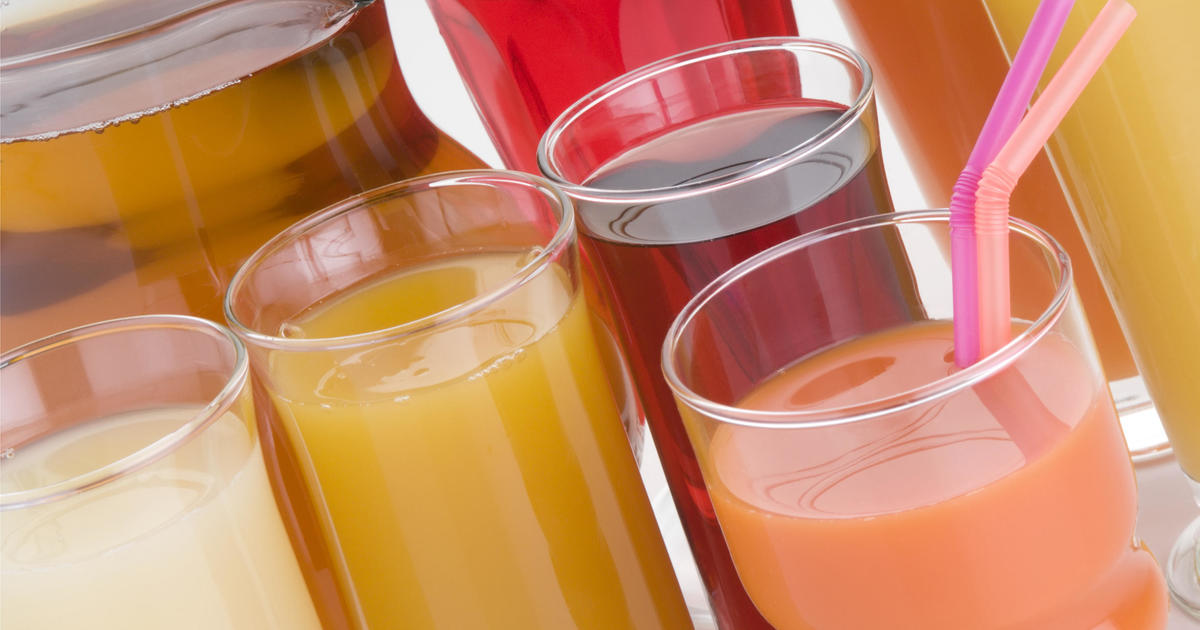Drinking one glass or more of 100% fruit juice each day is associated with weight gain in children and adults, according to a new analysis of 42 previous studies.
The research, published Tuesday in JAMA Pediatrics, found a positive association between drinking 100% fruit juice and BMI — a calculation that takes into account weight and height — among kids. It also found an association between daily consumption of 100% fruit juice with weight gain among adults.
100% fruit juice was defined as fruit juices with no added sugar.



I have a very vivid memory of working with this girl who had a neck so large that it hung down like a bullfrog’s sack. I had lost some weight myself and we were discussing nutrition and my high water consumption, and I remember she looks at me very seriously and a little exasperated and says, “I’m eating healthier too. I stopped drinking so much pop and switched entirely to juice.”
People really do believe that pure fruit juice is good for your body. I think it’s largely due to the average person’s inability to understand caloric intake and how to decipher a nutrional chart.
I just check the orange juice I buy. Just generic supermarket branded. 45 calories per 100ml. Coca Cola is 42.
There are people are drinking several litres a day of this shit, on top of all the normal stuff they eat.
The study makes it clear that’s the problem. The article is trying to spin it into fruit juice being as bad as soda.
I mean it’s probably better than soda right?
In that it has more nutrients, yes. But once the fruit is blitzed, the sugars in it are just as available as any other highly processed sugar. It’s a lot worse than just eating the fruit it came from.
Still, going from pop to juice is a step in the right direction. It’s an early step on a long journey, but a step nonetheless.
One reason a lot of people fail to switch to a healthy diet is because they try to go straight from “whatever the hell I want to eat whenever I want to eat it” to “trendy diet full of food I hate only allowed 2 meals per day”.
Switching from pop to juice is far from the last step, but it’s a good conscious decision if they’re committed to continuing.
Unless they think it is healthier and have no intention of quitting it, of course.
It’s also expensive as hell buying healthier products to find a balance you like and is healthy. For example I’m trying to move away from white rice. (I added it to literally everything when I was poor because it was cheap and halfway nutritious.) Now I’m finding out I don’t like Quinoa. So I’m going to try brown rice and whole wheat pasta. That particular exchange isn’t horribly expensive but I never would have risked not liking something when I was hard up for money.
So people make this decision, check out blogs, try super expensive kale, find out they aren’t in the group that likes it, and give up because they don’t have the time or money to experiment properly.
Yeah, I tried brown rice as a similar step and it really doesn’t work. Maybe it’s my rice maker though, since brown rice from a restaurant is much better. At home, brown rice ends up too chewy, like it’s undercooked. I’ve tried other grains on and off but they tend to take much linger: I have a bag of Kamut I’ve never used because it’s 45-60 minutes instead of the 15-20 for rice
I really dislike a lot of the more fibrous alternatives to our diner carbohydrates. Some more expensive pasta brands can somehow ‘hide’ more fibre then others, but still. I do exclusively high-fibre bread now, for lunch and snack moments (i just make ham and cheese toasties whenever i feel like a snack, can’t really eat more than 2-4 slices of bread that way before I feel full). I can leave my other carbohydrates as is. (for reference: i use about 60g uncooked dry paste pp per dinner)
Yes but one reason we get studies like this is fruit juice is the harm reduction for soda addicts. So BMI correlation is a poor measure.
BMI is a shit measure and studies like this are impossible to do well. That does not mean fruit juice is magically sugar-free.
I agree. The message should be; use in moderation. The message in the article and what many people are taking away though is avoid like soda and cigarettes.
BMI is kind of the okay and strongly correlates with health outcomes.
It is not a one size fits all tool, but it is a useful tool in aggregate.
Lol, I’ve never seen harm reduction used in a dietary context before.
Not enough to make a difference when concerning weight gain.